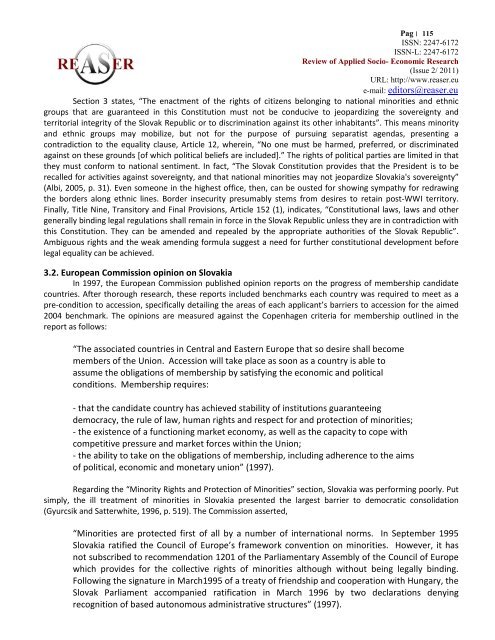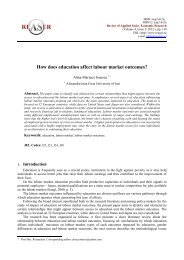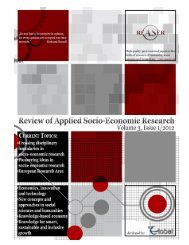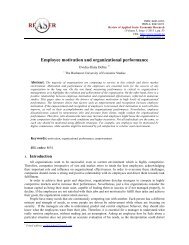3. ResultsPag׀ 114 ISSN: 2247-6172ISSN-L: 2247-6172<strong>Review</strong> <strong>of</strong> <strong>Applied</strong> <strong>Socio</strong>- <strong>Economic</strong> Research(Issue 2/ <strong>2011</strong>)URL: http://www.reaser.eue-mail: editors@reaser.eu3.1. The (Czecho)slovakian ConstitutionsThe federal composition <strong>of</strong> Czechoslovakia was addressed in Chapter 1, The Social Order, <strong>of</strong> theCzechoslovakia Constitution 1960. Citizen rights were set out in Chapter 2, stating, “Equal rights regardless <strong>of</strong>nationality, race, or sex are guaranteed. Education is free and compulsory to the age <strong>of</strong> sixteen; citizens <strong>of</strong>Hungarian, Ukrainian, and Polish origin are ensured ‘every opportunity and all means for education in theirmother tongue’” (Constitution <strong>of</strong> Czechoslovakia 1960). The above suggests minority protection <strong>of</strong> minorities wasin place under communist rule. The socialist model aspired to level all citizens to the status <strong>of</strong> workers, therebyfostering equality across the state, as opposed to different groups. However, there appeared to be room forpluralism as minority language rights were upheld. How this played out in practice is another matter.The Constitution <strong>of</strong> the Slovak Republic 1991, Preamble begins with, “We, the Slovak nation, mindful <strong>of</strong>the political and cultural heritage <strong>of</strong> our forebears, and <strong>of</strong> the centuries <strong>of</strong> experience from the struggle fornational existence and our own statehood...together with members <strong>of</strong> national minorities and ethnic groups livingon the territory <strong>of</strong> the Slovak Republic...”. Here, we see primacy <strong>of</strong> historically Slovakian citizens and the strugglefor sovereignty, and acknowledgment <strong>of</strong> minorities on Slovakian territory as distinct, but not Slovakian. Article 6,addressing language, states “(1) Slovak is the state language on the territory <strong>of</strong> the Slovak Republic. [and] (2) Theuse <strong>of</strong> other languages in dealings with the authorities will be regulated by law”, indicating strong nationalistsentiment among Slovakians, regarding language. No mention <strong>of</strong> the Magyar (Hungarian) language is strikingconsidering 700 000 ethnic Hungarians reside on the Slovakian/Hungarian border (Ramit, 1994, 99). While there isvague mention <strong>of</strong> “other languages” being regulated in <strong>of</strong>ficial dealings, there is nothing to suggest what thatmeans for bilingual policy options. The vagueness potentially omits <strong>of</strong>ficial protection <strong>of</strong> minority languages.Article 12, the Equality Clause, states,“(2) Basic rights and liberties on the territory <strong>of</strong> the Slovak Republic are guaranteed to everyoneregardless <strong>of</strong> sex, race, color <strong>of</strong> skin, language, creed and religion, political or other beliefs,national or social origin, affiliation to a nation or ethnic group, property, descent, or anotherstatus. No one must be harmed, preferred, or discriminated against on these grounds.(3) Everyone has the right to freely decide on his nationality. Any influence on this decision andany form <strong>of</strong> pressure aimed at assimilation are forbidden.”In a functioning democracy, an equality clause is an essential constitutional ingredient, but such a clausecan also present a legal loophole for dismissing minority rights on the premise that protecting minority languagesviolates constitutional rights, especially since promoting minority protection presents a case <strong>of</strong> ‘preferentialtreatment’ explicitly banned in Section 1. Section 3 discusses guarantees <strong>of</strong> protection against assimilation, whichon paper sounds good, but one must wonder how this plays out in practice considering minority status is notprotected.Part IV, Rights <strong>of</strong> National Minorities and Ethnic Groups, Article 34, is <strong>of</strong> particular interest. Rights tolanguage are set out and guaranteed, albeit in a limited manner, with the right to education and civil groups in themother tongue ‘acceptable’ under law. However, the onus to set up and maintain such institutions remains withthe minority groups themselves, as set out in Article 1. This begs the question <strong>of</strong> where project funding mightcome from. Klaus von Beyme (2003) claims, “...the Slovakian formulation ...did not impose a duty but onlymentioned the ‘right <strong>of</strong> ethnic minorities to learn the <strong>of</strong>ficial language.’ This did not rule out the possibility <strong>of</strong>conflict with the Hungarian minority...” (p. 203). Following an aggressive attempt to enforce the use <strong>of</strong> Slovakiannames <strong>of</strong> ethnically Hungarian cities and towns, the Council <strong>of</strong> Europe intervened (von Beyme, 2003, p. 203). Suchconstitutional omissions are interpreted as politically motivated restrictions on the use <strong>of</strong> Hungarian language byHungarians, Slovakian and national (Szépe, 1999, p. 81).
Pag׀ 115 ISSN: 2247-6172ISSN-L: 2247-6172<strong>Review</strong> <strong>of</strong> <strong>Applied</strong> <strong>Socio</strong>- <strong>Economic</strong> Research(Issue 2/ <strong>2011</strong>)URL: http://www.reaser.eue-mail: editors@reaser.euSection 3 states, “The enactment <strong>of</strong> the rights <strong>of</strong> citizens belonging to national minorities and ethnicgroups that are guaranteed in this Constitution must not be conducive to jeopardizing the sovereignty andterritorial integrity <strong>of</strong> the Slovak Republic or to discrimination against its other inhabitants”. This means minorityand ethnic groups may mobilize, but not for the purpose <strong>of</strong> pursuing separatist agendas, presenting acontradiction to the equality clause, Article 12, wherein, “No one must be harmed, preferred, or discriminatedagainst on these grounds [<strong>of</strong> which political beliefs are included].” The rights <strong>of</strong> political parties are limited in thatthey must conform to national sentiment. In fact, “The Slovak Constitution provides that the President is to berecalled for activities against sovereignty, and that national minorities may not jeopardize Slovakia's sovereignty”(Albi, 2005, p. 31). Even someone in the highest <strong>of</strong>fice, then, can be ousted for showing sympathy for redrawingthe borders along ethnic lines. Border insecurity presumably stems from desires to retain post-WWI territory.Finally, Title Nine, Transitory and Final Provisions, Article 152 (1), indicates, “Constitutional laws, laws and othergenerally binding legal regulations shall remain in force in the Slovak Republic unless they are in contradiction withthis Constitution. They can be amended and repealed by the appropriate authorities <strong>of</strong> the Slovak Republic”.Ambiguous rights and the weak amending formula suggest a need for further constitutional development beforelegal equality can be achieved.3.2. European Commission opinion on SlovakiaIn 1997, the European Commission published opinion reports on the progress <strong>of</strong> membership candidatecountries. After thorough research, these reports included benchmarks each country was required to meet as apre-condition to accession, specifically detailing the areas <strong>of</strong> each applicant’s barriers to accession for the aimed2004 benchmark. The opinions are measured against the Copenhagen criteria for membership outlined in thereport as follows:“The associated countries in Central and Eastern Europe that so desire shall becomemembers <strong>of</strong> the Union. Accession will take place as soon as a country is able toassume the obligations <strong>of</strong> membership by satisfying the economic and politicalconditions. Membership requires:- that the candidate country has achieved stability <strong>of</strong> institutions guaranteeingdemocracy, the rule <strong>of</strong> law, human rights and respect for and protection <strong>of</strong> minorities;- the existence <strong>of</strong> a functioning market economy, as well as the capacity to cope withcompetitive pressure and market forces within the Union;- the ability to take on the obligations <strong>of</strong> membership, including adherence to the aims<strong>of</strong> political, economic and monetary union” (1997).Regarding the “Minority Rights and Protection <strong>of</strong> Minorities” section, Slovakia was performing poorly. Putsimply, the ill treatment <strong>of</strong> minorities in Slovakia presented the largest barrier to democratic consolidation(Gyurcsik and Satterwhite, 1996, p. 519). The Commission asserted,“Minorities are protected first <strong>of</strong> all by a number <strong>of</strong> international norms. In September 1995Slovakia ratified the Council <strong>of</strong> Europe’s framework convention on minorities. However, it hasnot subscribed to recommendation 1201 <strong>of</strong> the Parliamentary Assembly <strong>of</strong> the Council <strong>of</strong> Europewhich provides for the collective rights <strong>of</strong> minorities although without being legally binding.Following the signature in March1995 <strong>of</strong> a treaty <strong>of</strong> friendship and cooperation with Hungary, theSlovak Parliament accompanied ratification in March 1996 by two declarations denyingrecognition <strong>of</strong> based autonomous administrative structures” (1997).








